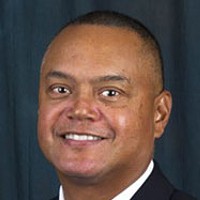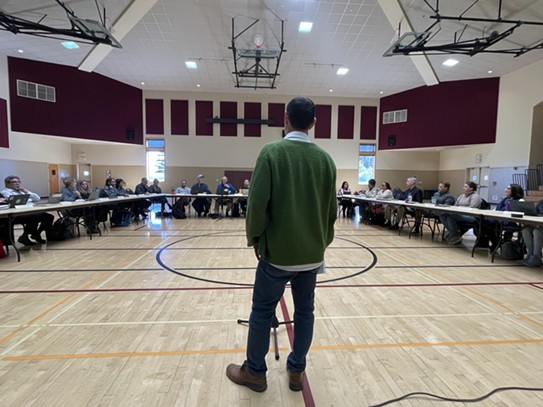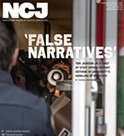Tuesday, May 7, 2024
CPH University Senate Calls for Independent Investigation into Protest Response
Posted By Thadeus Greenson @ThadeusGreenson on Tue, May 7, 2024 at 8:39 PM
Meeting at the Arcata Community Center because the Cal Poly Humboldt campus remained guarded by police under a hard closure, the University Senate voted overwhelmingly this afternoon to pass resolutions calling on the Humboldt County District Attorney to drop all charges against students and faculty involved in the pro-Palestinian protests that caused administration to shutter campus April 27.
In a separate resolution also overwhelmingly passed at the meeting, the Senate called for an independent investigation into “events and related decision-making process that followed the April 22, 2024 student protest actions.”
Both resolutions passed at a special, standing-room-only meeting that saw more than two hours devoted to the Senate hearing input from dozens of students, faculty and staff, as well as a handful of community members, about the protests and administration response that have deeply divided campus. While voices cracked, raised and faltered with emotion, senators largely sat silent and listened in what was the first organized forum allowing campus leadership to hear directly from the community it governs since hundreds of police officers descended on campus April 30, arresting 32 people — including 13 students and one professor — while clearing the protests that had occupied the heart of campus for more than a week.
Those arrested have not been charged by the Humboldt County District Attorney’s Office, as it has not yet received police reports documenting the cases against them. Meanwhile, 72 students have been served with interim suspension notices, though campus spokespeople have repeatedly declined to answer Journal questions detailing how the students were identified or what specific policies they stand accused of violating.
Protesters entered Siemens Hall, which houses a handful of classrooms and administrative offices, including that of the president, around 4:30 p.m. on April 22. Protesters have maintained their plan was to execute a “soft occupation” of the building that would bring attention to the Israel-Hamas War in Gaza, and the devastation it is causing Palestinian civilians in what protesters describe as an attempted genocide. Protest organizers said they intended to allow classes and core administrative functions to continue while they held the space.
A university press release today, however, maintains vandalism to the interior of the building had begun by the time police arrived, after which protesters refused police requests to leave the premises and began barricading entrances and exits.
Police wearing riot gear and wielding shields and batons would later try to force entry into the building while protesters pushed back, prompting a brief but violent exchange that left some officers with minor injuries and at least one protester with a head wound. Police then stood down and a week-long occupation of the building ensued, with protesters setting up tents around Siemens Hall and using Dumpsters, tables and other furniture to erect large barriers blocking access to the heart of campus.
Throughout the occupation and its aftermath, President Tom Jackson Jr. has faced sharp criticism, including a no-confidence vote from the Senate and a letter calling for his resignation signed by more than 400 members of the university’s staff and facult. Both the vote and letter stem from his handling of the situation, with many saying his early decision to call law enforcement ran against a campus tradition of allowing peaceful protest and dramatically escalated the situation.
Jackson did not attend today's meeting of the Senate, of which he is a member, and instead sent his chief of staff Mark Johnson to stand in as his proxy. Asked why Jackson wasn’t in attendance, Johnson said it was due to “legitimate concerns about his personal safety.”
At the outset of the meeting, Johnson said there has to be a “reckoning” on campus for decisions made by everyone involved in the protests and their aftermath, but added, “There is some investigative work that needs to be done before that reckoning can occur.”
To that end, the Senate voted — with 23 in favor, none opposed and one abstention — to call for an independent investigation into the protests and the university response that gives the investigator the authority to interview everyone involved and gives access to “all relevant documents.”
Sen. Stephanie Burkhalter, a Department of Politics professor, said an unbiased account of what transpired is crucial to reconcile the divergent views of what transpired.
“They’re trying to shape the narrative of what happened,” she said of campus administration, “and we really need an independent party to shape the narrative.”
Sen. James Graham, a professor in the Department of Environmental Sciences and Management, said he’s deeply concerned about the campus’ ability to open in the fall if steps aren’t made to “know what happened and make sure we can prevent it from happening again.”
The vote to call on the district attorney not to prosecute student and faculty protesters was similarly decisive, with 21 senators voting in favor, one voting no and four abstaining.
Sen. Tim Miller, representing the university library, said there is no consensus on campus that the protesters should have been arrested in the first place, pointing out similar occupations at Sonoma and Sacramento state universities were resolved peacefully without police.
When the meeting opened up to public comment, a steady stream of students, faculty and staff addressed the Senate, universally expressing concern for the treatment of protesters and the hard closure and ensuing police presence that disrupted campus life, shifted classes online and caused widespread unease among students and their families.
A group of students read a proposed draft senate resolution calling on the university, and the California State University system, to divest from interests profiting from the Israel-Hamas War and to call for a cease fire, which Senate President Jim Woglom, a professor in the Department of Art and Film, pledged the Senate Executive Committee would do in the coming days.
Speakers’ comments ranged from the history of Palestine and the Israel-Hamas conflict and the humanitarian crisis on the ground in Gaza to Jackson and his administration’s handling of the protests, which speakers almost universally regarded with sadness and disapproval, as they did the president’s having referred to the protesters as “criminals” who were no there for “noble causes.”
“It’s still like a police state,” Meredith Oram, an advisor, said of campus. “If I try to go to my office, I risk being arrested.”
Dan Barton, who chairs the Wildlife Department, said the university has failed its students, threatening them with arrest if they exercise their rights to assembly, protest and speech.
“This is some dystopian shit,” he said, apologizing that he didn’t have “better words.” He continued, “I wouldn’t be here if I didn’t believe in the mission of a public university and right now we are not meeting that mission.”
Another speaker charged that the university spends more on its police department annually than its cultural centers and Title IX office combined, which reflects its values, later blasting the university for calling police on the Black, brown and Indigenous students it works so hard to recruit to campus.
“They were not protecting us that night when they called the police, they were protecting property,” she said.
Loren Cannon, an environmental studies lecturer, expressed gratitude that student protesters had been the ones to push people on campus to pause and be “horrified” at what’s happing in Gaza, at “what’s happening to human beings.”
“We got to think about what’s happening and our responsibility for it,” Cannon said, adding that gratitude turned to deep disappointment at administration’s response.
Cannon ended by noting that Jackson wasn’t present, saying he never has been, imploring administrators who were in the room to take speakers’ messages back to the president and to ask him to respond to them in writing.
“He doesn’t just get to keep hiding,” Cannon said.
Lisa Tremain, who chairs the English Department, said she hadn’t planned on speaking but felt compelled to, saying she feels the university is crafting a media narrative that criminalizes students, robbing them of their voice.
She then turned to the students in attendance: “The reason the campus is still closed is because they are terrified of you.”
The meeting ran 30 minutes longer than scheduled, wrapping when it was announced a youth basketball league needed the community center floor for practice. As Johnson left the building, a group of students stood by, chanting, “Mark Johnson, please step down.”
In a separate resolution also overwhelmingly passed at the meeting, the Senate called for an independent investigation into “events and related decision-making process that followed the April 22, 2024 student protest actions.”
Both resolutions passed at a special, standing-room-only meeting that saw more than two hours devoted to the Senate hearing input from dozens of students, faculty and staff, as well as a handful of community members, about the protests and administration response that have deeply divided campus. While voices cracked, raised and faltered with emotion, senators largely sat silent and listened in what was the first organized forum allowing campus leadership to hear directly from the community it governs since hundreds of police officers descended on campus April 30, arresting 32 people — including 13 students and one professor — while clearing the protests that had occupied the heart of campus for more than a week.
Those arrested have not been charged by the Humboldt County District Attorney’s Office, as it has not yet received police reports documenting the cases against them. Meanwhile, 72 students have been served with interim suspension notices, though campus spokespeople have repeatedly declined to answer Journal questions detailing how the students were identified or what specific policies they stand accused of violating.
Protesters entered Siemens Hall, which houses a handful of classrooms and administrative offices, including that of the president, around 4:30 p.m. on April 22. Protesters have maintained their plan was to execute a “soft occupation” of the building that would bring attention to the Israel-Hamas War in Gaza, and the devastation it is causing Palestinian civilians in what protesters describe as an attempted genocide. Protest organizers said they intended to allow classes and core administrative functions to continue while they held the space.
A university press release today, however, maintains vandalism to the interior of the building had begun by the time police arrived, after which protesters refused police requests to leave the premises and began barricading entrances and exits.
Police wearing riot gear and wielding shields and batons would later try to force entry into the building while protesters pushed back, prompting a brief but violent exchange that left some officers with minor injuries and at least one protester with a head wound. Police then stood down and a week-long occupation of the building ensued, with protesters setting up tents around Siemens Hall and using Dumpsters, tables and other furniture to erect large barriers blocking access to the heart of campus.
Throughout the occupation and its aftermath, President Tom Jackson Jr. has faced sharp criticism, including a no-confidence vote from the Senate and a letter calling for his resignation signed by more than 400 members of the university’s staff and facult. Both the vote and letter stem from his handling of the situation, with many saying his early decision to call law enforcement ran against a campus tradition of allowing peaceful protest and dramatically escalated the situation.
Jackson did not attend today's meeting of the Senate, of which he is a member, and instead sent his chief of staff Mark Johnson to stand in as his proxy. Asked why Jackson wasn’t in attendance, Johnson said it was due to “legitimate concerns about his personal safety.”
At the outset of the meeting, Johnson said there has to be a “reckoning” on campus for decisions made by everyone involved in the protests and their aftermath, but added, “There is some investigative work that needs to be done before that reckoning can occur.”
To that end, the Senate voted — with 23 in favor, none opposed and one abstention — to call for an independent investigation into the protests and the university response that gives the investigator the authority to interview everyone involved and gives access to “all relevant documents.”
Sen. Stephanie Burkhalter, a Department of Politics professor, said an unbiased account of what transpired is crucial to reconcile the divergent views of what transpired.
“They’re trying to shape the narrative of what happened,” she said of campus administration, “and we really need an independent party to shape the narrative.”
Sen. James Graham, a professor in the Department of Environmental Sciences and Management, said he’s deeply concerned about the campus’ ability to open in the fall if steps aren’t made to “know what happened and make sure we can prevent it from happening again.”
The vote to call on the district attorney not to prosecute student and faculty protesters was similarly decisive, with 21 senators voting in favor, one voting no and four abstaining.
Sen. Tim Miller, representing the university library, said there is no consensus on campus that the protesters should have been arrested in the first place, pointing out similar occupations at Sonoma and Sacramento state universities were resolved peacefully without police.
When the meeting opened up to public comment, a steady stream of students, faculty and staff addressed the Senate, universally expressing concern for the treatment of protesters and the hard closure and ensuing police presence that disrupted campus life, shifted classes online and caused widespread unease among students and their families.
A group of students read a proposed draft senate resolution calling on the university, and the California State University system, to divest from interests profiting from the Israel-Hamas War and to call for a cease fire, which Senate President Jim Woglom, a professor in the Department of Art and Film, pledged the Senate Executive Committee would do in the coming days.
Speakers’ comments ranged from the history of Palestine and the Israel-Hamas conflict and the humanitarian crisis on the ground in Gaza to Jackson and his administration’s handling of the protests, which speakers almost universally regarded with sadness and disapproval, as they did the president’s having referred to the protesters as “criminals” who were no there for “noble causes.”
“It’s still like a police state,” Meredith Oram, an advisor, said of campus. “If I try to go to my office, I risk being arrested.”
Dan Barton, who chairs the Wildlife Department, said the university has failed its students, threatening them with arrest if they exercise their rights to assembly, protest and speech.
“This is some dystopian shit,” he said, apologizing that he didn’t have “better words.” He continued, “I wouldn’t be here if I didn’t believe in the mission of a public university and right now we are not meeting that mission.”
Another speaker charged that the university spends more on its police department annually than its cultural centers and Title IX office combined, which reflects its values, later blasting the university for calling police on the Black, brown and Indigenous students it works so hard to recruit to campus.
“They were not protecting us that night when they called the police, they were protecting property,” she said.
Loren Cannon, an environmental studies lecturer, expressed gratitude that student protesters had been the ones to push people on campus to pause and be “horrified” at what’s happing in Gaza, at “what’s happening to human beings.”
“We got to think about what’s happening and our responsibility for it,” Cannon said, adding that gratitude turned to deep disappointment at administration’s response.
Cannon ended by noting that Jackson wasn’t present, saying he never has been, imploring administrators who were in the room to take speakers’ messages back to the president and to ask him to respond to them in writing.
“He doesn’t just get to keep hiding,” Cannon said.
Lisa Tremain, who chairs the English Department, said she hadn’t planned on speaking but felt compelled to, saying she feels the university is crafting a media narrative that criminalizes students, robbing them of their voice.
She then turned to the students in attendance: “The reason the campus is still closed is because they are terrified of you.”
The meeting ran 30 minutes longer than scheduled, wrapping when it was announced a youth basketball league needed the community center floor for practice. As Johnson left the building, a group of students stood by, chanting, “Mark Johnson, please step down.”
Speaking of...
-

Jackson Stepping Down at Cal Poly Humboldt
Jul 11, 2024 -

Cal Poly Readying to Turn Protest Police Reports Over to DA
May 21, 2024 -

CPH's Johnson Speaks, SoHum Eats and Card Sharks
May 18, 2024 - More »
Readers also liked…
more from the author
-
Jackson's Retreat
The contract clause that allowed Cal Poly Humboldt's embattled president to step down into a high-paid instructional position
- Jul 25, 2024
-
'Profound Concern'
Alleged victim distressed by DA's handling of hate speech, antisemitic threats case
- Jul 25, 2024
-
'Inadvertent Disclosure'
Eureka City Schools emails shed light on Jacobs property swap
- Jul 25, 2024
- More »
































